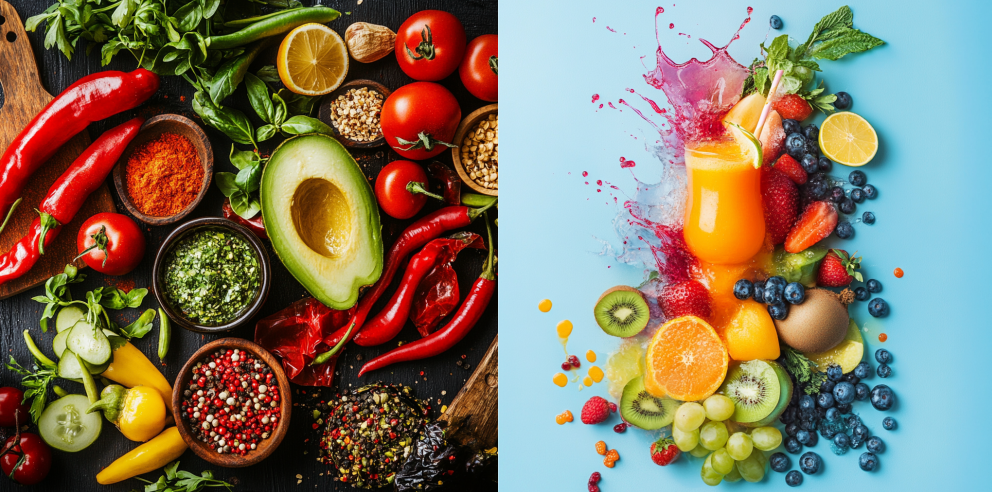The food and beverage industry is undergoing a seismic shift, driven by bold innovations, changing consumer expectations, and a growing commitment to sustainability. From AI-powered meal personalisation to ultra-premium dining experiences, 2025 is shaping up to be a year of transformation. But these aren't just futuristic concepts, many companies are already making waves, leveraging cutting-edge technology, regenerative practices, and creative culinary approaches to redefine how we eat and drink. In this article, we explore the top trends that will dominate 2025 and highlight the businesses that are already leading the charge.
1 | Hyper-Personalised Dining Experiences
Advancements in artificial intelligence and data analytics are revolutionising how consumers interact with food. Restaurants and brands are leveraging AI-driven recommendations, smart menus, and DNA-based nutrition to offer hyper-personalised experiences. Expect tailored meal plans, precision nutrition apps, and even beverages crafted to match an individual’s taste profile.
Case Study: Spoon Guru, a UK-based AI-driven food discovery platform, helps retailers and consumers find food products tailored to their dietary needs, scanning ingredients for allergens and personal preferences in real time.
2 | Regenerative Agriculture & Carbon-Neutral Foods
Sustainability remains a dominant theme, but in 2025, the focus shifts beyond sustainability to regenerative agriculture, practices that restore soil health, increase biodiversity, and sequester carbon. Carbon-neutral and even carbon-negative food products will gain traction, with companies investing in eco-friendly sourcing and regenerative farming partnerships.
Interesting Fact: Danone has pledged to achieve carbon neutrality by 2050, with key investments in regenerative agriculture to improve soil health and reduce emissions.
3 | Functional & Mood-Boosting Ingredients
Consumers are increasingly looking for food and drinks that not only taste good but also support their well-being. Adaptogens, nootropics, and gut-friendly ingredients are making their way into everyday items. Expect a rise in beverages infused with magnesium for relaxation, mushroom-based coffee alternatives for cognitive function, and gut-health-focused snacks featuring prebiotics and probiotics.
Case Study: PepsiCo launched Driftwell, a functional water infused with L-theanine and magnesium to help reduce stress and promote relaxation.
4 | AI-Powered Food & Beverage Development
Artificial intelligence is not just personalising meals, it’s also creating them. AI-driven product development is streamlining innovation, allowing brands to formulate flavours and textures that appeal to emerging consumer preferences. From machine-generated recipes to AI-driven beverage blending, technology is helping companies bring new products to market faster than ever.
Interesting Fact: IBM’s AI-powered Chef Watson has collaborated with chefs worldwide to create innovative recipes by analysing ingredient compatibility and flavour combinations.
5 | Ultra-Premium & Experiential Dining
While affordability remains a concern for many, there’s also a growing appetite for ultra-premium experiences. Consumers are seeking out rare ingredients, limited-edition collaborations, and immersive dining events. Think multi-sensory dining with augmented reality, private chef tastings with bespoke menus, and rare vintage spirits served in exclusive settings.
Case Study: Sublimotion in Ibiza offers a multi-sensory dining experience, blending virtual reality, performance art, and molecular gastronomy for a high-end, immersive meal priced at over $2,000 per guest.
6 | Zero-Waste Kitchens & Upcycled Ingredients
Sustainability efforts are extending into the kitchen with a strong focus on reducing food waste. Expect to see more restaurants and food brands embracing upcycled ingredients, using food byproducts that would otherwise go to waste. Brands are finding creative ways to turn surplus produce into snack bars, repurpose coffee grounds into flour, and craft sustainable cocktails using leftover fruit peels.
Interesting Fact: The UK-based company Toast Ale brews craft beer using surplus bread, reducing food waste while creating an eco-friendly beverage.
7 | New Wave of Non-Alcoholic Beverages
The non-alcoholic beverage market is booming, with a shift from simple mocktails to complex, sophisticated alternatives. Expect spirit-free options featuring botanical distillates, functional adaptogens, and fermented beverages. Low-ABV cocktails and hybrid drinks that blend the best of alcohol and no-alcohol options will also continue to rise in popularity.
Case Study: Seedlip, the world’s first distilled non-alcoholic spirit, has revolutionised the way people enjoy cocktails without alcohol, offering sophisticated botanical blends.
8 | Asian & Middle Eastern Fusion Flavours
Global palates continue to expand, with 2025 seeing a surge in bold, umami-packed flavours from Asia and the Middle East. Expect a rise in dishes featuring fermented black garlic, yuzu kosho, harissa honey, and sumac-infused creations. Traditional techniques like Japanese binchotan grilling and Levantine mezze spreads are making waves in fine dining and casual eateries alike.
Interesting Fact: The global kimchi market is expected to surpass $6 billion by 2027, driven by the increasing demand for probiotic-rich, fermented foods.
9 | AI-Powered Drive-Thrus & Smart Restaurants
Tech is transforming quick-service dining, with AI-powered drive-thrus, automated kitchens, and robotic servers becoming more commonplace. Chains are integrating facial recognition, voice AI ordering, and predictive analytics to speed up service and enhance the customer experience.
Case Study: McDonald’s acquired AI startup Apprente to improve its drive-thru technology, reducing order times and improving customer service with voice recognition AI.
10 | Plant-Based 2.0: Whole Foods Over Processed Alternatives
While plant-based eating remains strong, consumers are pivoting toward less processed options. Instead of imitation meats, expect to see a rise in whole-food-based plant proteins like jackfruit, mushroom blends, and chickpea-derived products. The focus is on clean-label, nutrient-dense alternatives rather than ultra-processed plant-based meats.
Interesting Fact: According to a recent survey, 65% of consumers are more inclined to buy plant-based products with fewer ingredients and no artificial additives.
How Sonder Capital Limited Can Help
At Sonder Capital Limited, we specialise in strategic growth, data-driven insights, and commercial partnerships to help food and beverage brands stay ahead of the curve. As 2025 ushers in a wave of innovation, from AI-powered personalisation to regenerative agriculture, we provide the expertise and connections to turn these trends into tangible business opportunities.
✔ Market Intelligence & Strategic Planning
We help businesses understand evolving consumer preferences and industry shifts, ensuring they make informed decisions. Our insights empower brands to craft strategies that align with sustainability goals, premiumisation, and personalisation.
✔ Commercial Partnerships & Business Development
Through our extensive network in hospitality, consumer goods, and experiential marketing, we connect brands with the right partners, whether it’s AI-driven food tech companies, luxury experience providers, or sustainable sourcing initiatives.
✔ Sustainability & ESG Strategy
Consumers demand more transparency and accountability. We guide brands in adopting regenerative agriculture, carbon-neutral practices, and waste reduction initiatives, helping them meet both regulatory standards and consumer expectations.
✔ Brand Positioning & Storytelling
As experiential dining and premiumisation gain momentum, we craft compelling narratives that resonate with audiences. Whether it's repositioning a brand for ultra-premium experiences or elevating sustainability messaging, we ensure businesses stand out in a competitive market.
From legacy brands to emerging startups, Sonder Capital Limited is your strategic partner in shaping the future of food and beverage.

